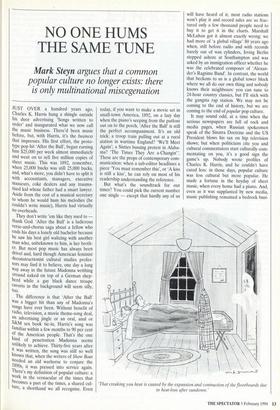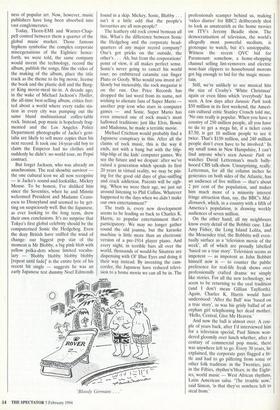NO ONE HUMS THE SAME TUNE
Mark Steyn argues that a common
popular culture no longer exists: there is only multinational miscegenation
JUST OVER a hundred years ago, Charles K. Harris hung a shingle outside his door advertising 'Songs written to order' and inaugurated what we now call the music business. There'd been music
before, but, with Harris, it's the business that impresses. His first effort, the proto- type pop hit 'After the Ball', began earning him $25,000 per week almost immediately and went on to sell five million copies of
sheet music. This was 1892, remember, when 25,000 bucks was still 25,000 bucks, and, what's more, you didn't have to split it with accountants, managers, executive masseurs, coke dealers and any trauma- tised kid whose father had a smart lawyer. Aside from the cost of a musical secretary to whom he would hum his melodies (he couldn't write music), Harris had virtually no overheads.
They don't write 'em like they used to thank God. 'After the Ball' is a ludicrous verse-and-chorus saga about a fellow who ends his days a lonely old bachelor because he saw his best girl waltzing with another man who, unbeknown to him, is her broth- er. But most pop music has always been drivel and, hard though American feminist deconstructionist cultural studies profes- sors may find it to believe, one day a long Way away in the future Madonna writhing around naked' on top of a German shep- herd while a gay black dance troupe cavorts in the background will seem silly, too.
The difference is that 'After the Ball' was a bigger hit than any of Madonna's songs have ever been. Without benefit of radio, television, a movie theme-song deal, an advertising jingle or an oral, anal or S&M sex book tie-in, Harris's song was familiar within a few months to 90 per cent of the American people. That's the one kind of penetration Madonna seems unlikely to achieve. Thirty-five years after it was written, the song was still so well known that, when the writers of Show Boat needed an old warhorse to conjure the 1890s, it was pressed into service again. There's my definition of popular culture: a work in the vernacular of the times that becomes a part of the times, a shared cul- ture, a shorthand we all recognise. Even
today, if you want to make a movie set in small-town America, 1892, on a lazy day when the piano's seeping from the parlour out on to the porch, 'After the Ball' is still the perfect accompaniment. It's an old trick: a troop train pulling out at a rural station in wartime England? 'We'll Meet Again'; a Sixties bussing protest in Alaba- ma? The Times They Are a-Changin". These are the props of contemporary com- munication: when a sub-editor headlines a piece 'You must remember this', or 'A kiss is still a kiss', he can rely on most of his readership understanding the reference.
But what's the soundtrack for our times? You could pick the current number one single — except that hardly any of us
will have heard of it, most radio stations won't play it and record sales are so frac- tured only a few thousand people need to buy it to get it in the charts. Marshall McLuhan got it almost exactly wrong: we had more of 'a global village' 80 years ago when, still before radio and with records barely out of wax cylinders, Irving Berlin stepped ashore at Southampton and was asked by an immigration officer whether he was the celebrated composer of 'Alexan- der's Ragtime Band'. In contrast, the world that beckons to us is a global tower block where we all do our own thing and nobody knows their neighbours: you can tune to 24-hour country classics, but I'll stick with the gangsta rap station. We may not be coming to the end of history, but we are coming to the end of popular pop culture.
It may sound odd, at a time when the serious newspapers are full of rock and media pages, when Russian spokesmen speak of the Sinatra Doctrine and the US President blows his sax on hip television shows; but when politicians cite you and cultural commentators start culturally com- mentating on you, it's a good sign the game's up. Nobody wrote profiles of Charles K. Harris, and he couldn't have cared less: in those days, popular culture was less cultural but more popular. He made a fortune in the heyday of sheet music, when every home had a piano. And, even as it was supplanted by new media, music publishing remained a bedrock busi- 'That creaking you hear is caused by the expansion and contraction of the floorboards due to heat-loss after sundown.' ness of popular art. Now, however, music publishers have long been absorbed into vast conglomerates.
Today, Thorn-EMI and Warner-Chap- pell control between them a quarter of the global music market. Those famous hyphens symbolise the complex corporate miscegenations of the Eighties: hence- forth, we were told, the same company would invent the technology, record the album, publish the songs, film the video of the making of the album, place the title track as the theme to its big movie, license the book and the plastic doll and the Burg- er King movie-meal tie-in. A decade ago, in the wake of Michael Jackson's Thriller, the all-time best-selling album, critics fret- ted about a world where every radio sta- tion in every city was pumping out the same bland multinational coffee-table rock. Instead, pop music is hopelessly frag- mented and the Los Angeles Police Department photographs of Jacko's geni- talia are likely to sell more copies than his next record. It took one 14-year-old boy to claim the Emperor had no clothes and suddenly he didn't: no world tour, no Pepsi contract.
But forget Jackson, who was already an anachronism. The real showbiz survivor the one cultural icon we all now recognise — is Jacko's sound-and-lookalike, Mickey Mouse. To be honest, I've disliked him since the Seventies, when he and Minnie welcomed President and Madame Ceaus- escu to Disneyland and seemed to be get- ting on suspiciously well. But the Japanese, as ever looking to the long term, drew their own conclusions. It's no surprise that Tokyo's first global celebrity should be the computerised Sonic the Hedgehog. Even the dozy British have sniffed the wind of change: our biggest pop star of the moment is Mr Blobby, a big pink blob with yellow polka-dots whose limited vocabu- lary — `Blobby blobby blobby blobby [repeat until fader is the entire lyric of his recent hit single — suggests he was an early Japanese test dummy Noel Edmonds found in a skip. Mickey, Sonic, Blobby . . . isn't it a little odd that the people's favourites are all non-people?
The leathery old rock crowd bemoan all this. What's the difference between Sonic the Hedgehog and the corporate head- quarters of any major record company? One's got pricks on the outside, the other's . . . Ah, but from the corporations' point of view, it all makes perfect sense. Sonic's never going to cancel his world tour; no embittered catamite can finger Pluto or Goofy. Who would you invest in? Slowly but inexorably, the rock megastar is on the run. Our Price Records has dropped the last word from its name, not wishing to alienate fans of Super Mario another pop icon who stars in computer games — and Sonic. Super Mario has even annexed one of rock music's most hallowed traditions: just like Elvis, Bowie and Madonna, he made a terrible movie.
Michael Crichton would probably find a Japanese conspiracy in this. After all the claims of rock music, this is the way it ends, not with a bang but with the blip- blip-blip of the kids' computer games. We see the future and we despair: after we've raised a generation which spends its first 20 years in virtual reality, we may be pin- ing for the good old days of glue-sniffing and crack addiction. Parents will be sigh- ing, 'When we were their age, we just sat around listening to Phil Collins. Whatever happened to the days when we didn't make our own entertainment?'
The truth is, every new development seems to be leading us back to Charles K. Harris, to popular entertainment that's participatory. We may no longer gather round the old joanna, but the karaoke machine is little more than an electronic version of a pre-1914 player piano. And every night, in terrible bars all over the world, thousands of would-be Sinatras are dispensing with 01' Blue Eyes and doing it their way instead. By inventing the cam- corder, the Japanese have reduced televi- sion to a home movie we can all be in. The
'Bloody Germans . .
professionals scamper behind us, making `video diaries' for BBC2 deliberately shot to look as amateurish as the home movies on ITV's Jeremy Beadle show. The democratisation of television, the world's allegedly most powerful medium, is grotesque to watch, but it's unstoppable. Witness the recent QVC bid for Paramount: somehow, a home-shopping channel selling lint-removers and electric nose-hair clippers to housebound morons got big enough to bid for the magic moun- tain.
Still, we're unlikely to see musical hits the size of Crosby's 'White Christmas' again or even films which 'everybody' has seen. A few days after Jurassic Park took $50 million in its first weekend, the Ameri- can cultural critic Stanley Crouch told me, 'No one really is popular. When you have a country of 250 million people, all you have to do to get a mega hit, if a ticket costs $7.50, is get 10 million people to see it twice. That's $150 million, and 240 million people don't even have to be involved.' In my small town in New Hampshire, I can't find anyone who's seen Jurassic Park or watches David Letterman's much bally- hooed CBS talk-show. Unsurprising, really: Letterman, for all the column inches he generates on both sides of the Atlantic, has an audience of five million — that's about 2 per cent of the population, and makes him much more of a minority interest fringe attraction than, say, the BBC's Mid- dlemarch, which, in a country with a fifth of America's population, is drawing weekly audiences of seven million.
On the other hand, all my neighbours know every detail of the Bobbitt case. Like Amy Fisher, the Long Island Lolita, and the Menendez trial, the Bobbitts will even- tually surface as a 'television movie of the week', all of which are proudly labelled `based on a true story'. Television seems as impotent — as impotent as John Bobbin himself now is — to counter the public preference for real-life freak shows over professionally crafted drama: we simply like stories. For all the new technology, we seem to be returning to the oral tradition (and I don't mean Gillian Taylforth). Again, Charles K. Harris would have understood: 'After the Ball' was 'based on a true story', as was his grisly ballad of an orphan girl telephoning her dead mother, 'Hello, Central, Give Me Heaven.'
And now the ball is almost over. A cou- ple of years back, after I'd interviewed him for a television special, Paul Simon won-
dered gloomily over lunch whether, after a century of commercial pop music, there
was anywhere left to go. Every 30 years, he
explained, the corporate guys flagged a ht- tle and had to go pilfering from some or
other folk tradition: in the Twenties, jazz; in the Fifties, rhythm'n'blues; in the Eight- ies, world music — West African rhythms.
Latin American salsa. 'The trouble now,' said Simon, 'is that they've nowhere left to steal from.'



















































 Previous page
Previous page